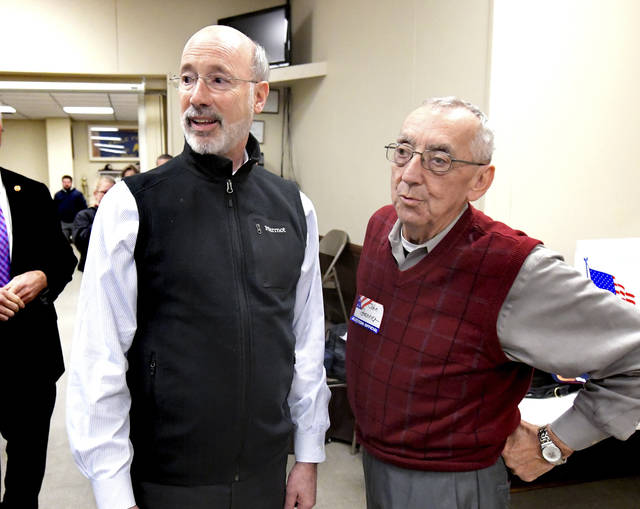HARRISBURG, Pa. — Tom Wolf won a second term as Pennsylvania governor on Tuesday, beating brash Republican challenger Scott Wagner and sending the Democrat back for another four years to share power with a GOP-controlled Legislature.
Wolf has said he will continue advancing his first-term priorities, including trying to fix funding inequities in public schools and seeking to impose a severance tax on the Marcellus Shale natural gas industry. But he will be up against Republican lawmakers who fought two extended budget battles with him, blocked many of his top priorities and forced him to lower his expectations.
Even so, Wolf’s re-election will give Democrats a seat at the table for the first time in 30 years when Pennsylvania draws a new map of congressional districts after the 2020 Census.
Wolf, speaking to supporters in York on Tuesday night, said Pennsylvanians voted for a state “that has a really bright future” and “for a public service that actually has integrity, that you can trust.”
In brief remarks, Wolf said people had voted for better lives, better schools, a strong economy, access to quality and affordable health care and a fairer Pennsylvania for everyone, regardless of race, gender or religion.
“I’m proud of what we’ve already done together,” Wolf said. “But four years ago I stood before you and said, ‘You know, we have a lot of work to do, so let’s get started.’ Tonight, I have basically the same message: We still have a lot of work to do. So let’s back to work, all right?”
The incumbent ran what analysts called a conservative campaign designed to limit mistakes and take advantage of Wagner’s liabilities.
Wolf refused to debate Wagner more than once, and his campaign worked to capitalize on Wagner’s penchant for eyebrow-raising off-the-cuff comments. That included advising Wolf last month to put on a catcher’s mask because “I’m going to stomp all over your face with golf spikes.”
The two candidates were studies in contrast. Wolf is soft-spoken and chooses his words carefully. When Wagner announced his candidacy, he declared, “I am going to be the next governor, take that to the bank.”
Wagner, a 63-year-old former state senator who made millions from his garbage-hauling business, mostly self-financed his campaign. He had promised to cut taxes and rein in an out-of-control state government. But he fought an unexpectedly bruising and expensive three-way primary, and spent considerable time trying to walk back previous comments he had made, including criticisms public schools and teachers, while struggling to exploit a weakness in his opponent.
Meanwhile, Wolf heavily outraised and outspent Wagner, with help from labor unions that Wagner had made the target of some of his sharpest criticisms.
Wolf, 69, ran his family’s building products company for most of three decades before becoming governor in 2015, except for a short stint as Pennsylvania’s revenue secretary.
He has been a champion for liberal causes, including imposing an effective moratorium on the death penalty, defending Pennsylvania’s expansion of Medicaid under the 2010 federal health care law known as “Obamacare” and blocking legislation that would have curtailed abortion rights.
Joining Wolf as lieutenant governor will be John Fetterman, the Braddock mayor whose efforts to improve the impoverished town over the past 13 years drew national attention and made him a media darling. Fetterman beat sitting Lt. Gov. Mike Stack in a five-way Democratic primary in May.


